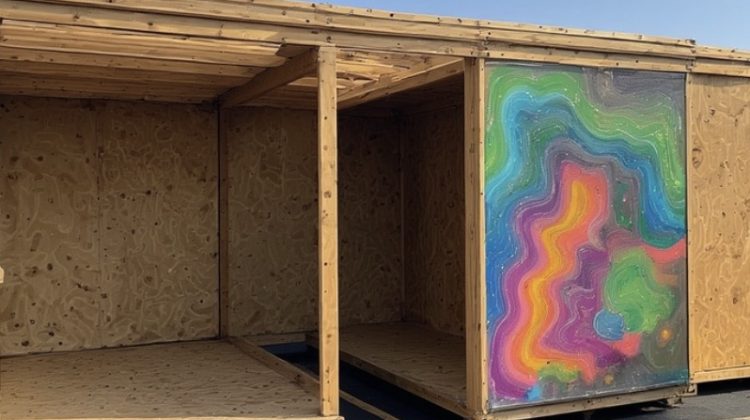PEABODY — The Cantor Institute will be building insulated, micro-shelters from reclaimed construction scraps for unhoused neighbors in Peabody. The nonprofit organization is aiming for an October roll out ahead of winter.
After a winter survey with unhoused residents, a small team at the Cantor Institute moved from miniature models to human-scale builds of portable emergency shelters made almost entirely from construction waste. The effort is now entering a new round of pilots in Peabody this fall and winter.
The project’s premise is straightforward: reclaim scrap plywood and insulation panels from partnered construction companies, and turn them into low-cost, quickly assembled, movable units that offer immediate relief with basic comfort and privacy.
The latest version, v3, has a footprint of about 42 square feet, R-8 insulation and two window openings. The structure relies on a riveted panel system and hinges for durability and speed of assembly; designs vary unit to unit because the team builds with whatever materials can be salvaged at scale.
Field testing to date shows the units are stable, usable and more livable with the added window cutouts and insulation. Power and lighting are handled by attachable solar mats currently under evaluation for phone charging and nighttime illumination. In a small but intentional community touch, each new resident signs the roof ridge of their unit.
Site access for the early trials came through the City of Boston’s Department of Neighborhood Development, which provided a plot behind a park for testing. With those trials completed, the next phase will shift to Peabody for colder-weather pilots.
Summer work has centered on three pragmatic issues: refining panel geometry for repeatable builds, reinforcing hinge durability under frequent moves and tightening the rapid-assembly workflow.
The team frames its approach around two guiding principles: reuse discarded materials for deployable, dignified shelter and treat “negative space” as an opportunity where constraints become design inputs.
That mindset is visible in the evolving form factor: the riveted panels accept slight variance in scrap sizes, while standardized connection points enable fast assembly without specialized tools. The result is not a one-off showpiece but a pattern that can be repeated wherever similar waste streams exist.
Cantor Institute Founder Sid Mahajan is supported by advisor Michael Paliotta and a rotating group of local volunteers. Because material sourcing is tied to construction cycles, the team works with multiple companies rather than relying on a single donor to diversify supply and capture odd lots that would otherwise head to landfill.
Looking ahead, the group is seeking sponsors to expand the pilot, improve cold-weather performance and build out a repeatable kit for municipalities and service organizations. Interested parties can reach the team at [email protected].



